Cherry Blossom & Chiswick Polish Co
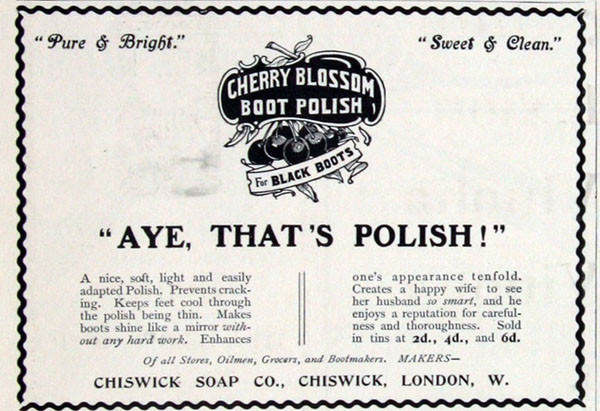
October 1903 advert complete with the packaging design of cherries, stalks and leaves that was to continue for the next 60 years or so.
Photo: Grace’s Guide
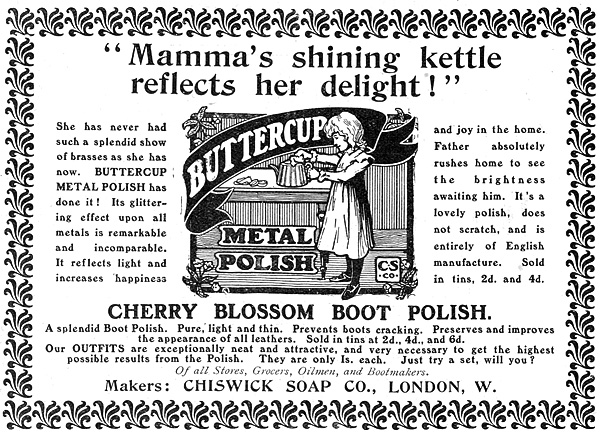
Cherry Blossom polish – Illustrated London News, Nov 1903
Photo: David Pratt
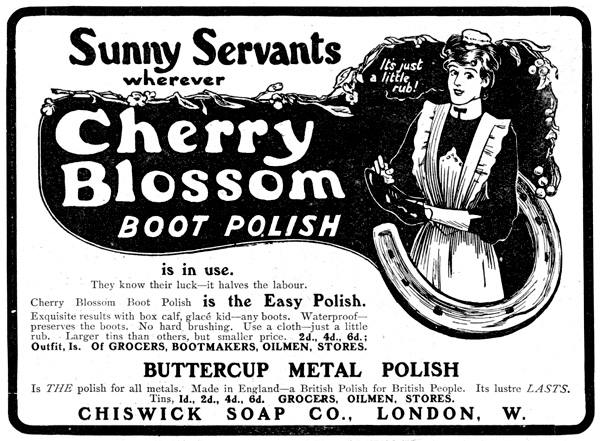
Cherry Blossom polish - Illustrated London News, March 1904
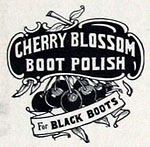 Of course it didn’t take long before there were polish manufactures popping up all over the place, often successful and entrepreneurial companies looking for additions product lines or adapting existing industrial processes or replacing the blacking products previously made. And so the iconic names of Cherry Blossom, Kiwi, Wren’s, Propert’s, Meltonian, Nugget, Cobra, Shinola and many others were born.
Of course it didn’t take long before there were polish manufactures popping up all over the place, often successful and entrepreneurial companies looking for additions product lines or adapting existing industrial processes or replacing the blacking products previously made. And so the iconic names of Cherry Blossom, Kiwi, Wren’s, Propert’s, Meltonian, Nugget, Cobra, Shinola and many others were born.
Charles married Kathleen Hurdis Jones in 1910 and they had three sons, Dan Hurdis in 1911, Charles Percy in 1913 and Arthur in 1916, and lived in Kensington. In 1921 Charles and Kathleen bought “The Haven”, Lancing, from the estate of Henry Howells. The description given in a later auction of the house was “On the Sussex Coast (with grounds to the sea) between Brighton and Worthing. A freehold house, solidly built. Eight bedrooms, bathroom, three or four reception rooms; stables, garage, outbuildings, and extensive range of vineries and peach houses; gardens, meadow and paddock about four acres in all”. They still kept their house in Kensington using The Haven as a holiday home.
In 1912 launched “Mansion Polish” a household furniture polish, which also became a huge success and the company was prospering.
 In 1913 a major business change was instigated – the Chiswick Polish Company Limited was formed, jointly owned by the Mason family and Reckitt & Sons Ltd. William Berry Ltd of Homerton, London, and The Master Polish company (Richard James & Co of West Bromwich, previously acquired in 1912 by Reckitt’s) were integrated into the Chiswick Polish Company and all metal polish operations transferred to Reckitt’s factory in Hull and the transfer of the soap manufacturing operations to Yalding in Kent. In 1917 the very well established business of Martindale, Massey & Co of Liverpool (an ink and blacking company dating to 1825 or earlier) was acquired and production moved to Chiswick. The process of acquisitions and mergers had begun in earnest.
In 1913 a major business change was instigated – the Chiswick Polish Company Limited was formed, jointly owned by the Mason family and Reckitt & Sons Ltd. William Berry Ltd of Homerton, London, and The Master Polish company (Richard James & Co of West Bromwich, previously acquired in 1912 by Reckitt’s) were integrated into the Chiswick Polish Company and all metal polish operations transferred to Reckitt’s factory in Hull and the transfer of the soap manufacturing operations to Yalding in Kent. In 1917 the very well established business of Martindale, Massey & Co of Liverpool (an ink and blacking company dating to 1825 or earlier) was acquired and production moved to Chiswick. The process of acquisitions and mergers had begun in earnest.
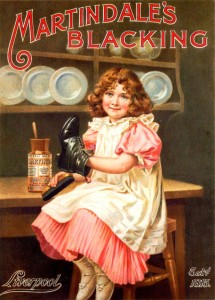 Dan and Charles were model and progressive employers, setting up a pension scheme for employees in 1923, creating ‘Forward’ a staff magazine, introducing a 44 hour 5 day week in 1918 and in 1930 50 semi-detached houses were provided for the work force. Another early innovation was a “dispensary” made up of a main surgery, rest rooms, a dental clinic and a chiropody clinic, all supervised by qualified personnel. In 1925 the Masons bought Boston House and adjoining buildings in Chiswick Square. Boston House was used as a social club for the female employees and the other buildings were rented to company employees as homes. Extensive grounds to Boston House were laid out for all types of games, including a bowling green, eight grass tennis courts and four all-weather courts, plus a well equipped sports pavilion. The Mason’s philanthropy extended to the purchasing of Afton House in Bourne Place, thoroughly renovating and refurnishing it and letting it to The Chiswick Memorial Club at a peppercorn rent. Afterwards it was handed over to trustees to remain perpetually a club for ex-service men. However, perhaps the Mason’s greatest work was the establishment of the Hospital, which he later endowed, by buying Rothbury House and behind it erected the Hospital which has been added to in the course of time. From it’s small beginnings in Burlington Lane it broadened out into the present Hospital in The Mall. Dan Mason’s interest in the life of the younger members of the community was shown by the establishment of a much needed crèche or day nursery in the crowded area of Bennett Street. Dan Mason first became interested in West London Hospital in 1914, when he became an anonymous donor introduced by Dr Shuter. He later generously undertook to be responsible for the building of the new nurses home. Since then, many improvements have been carried out. Dr Shuter became the doctor attached to Chiswick Polish Co Ltd / Chiswick Products Ltd, and served in that capacity for nearly 50 years.Many other people have benefited from the generosity of Mr Mason who also generously supported the Salvation Army, Church Army, St Dunstans and South Eastern Hospital for children at Lewisham.
Dan and Charles were model and progressive employers, setting up a pension scheme for employees in 1923, creating ‘Forward’ a staff magazine, introducing a 44 hour 5 day week in 1918 and in 1930 50 semi-detached houses were provided for the work force. Another early innovation was a “dispensary” made up of a main surgery, rest rooms, a dental clinic and a chiropody clinic, all supervised by qualified personnel. In 1925 the Masons bought Boston House and adjoining buildings in Chiswick Square. Boston House was used as a social club for the female employees and the other buildings were rented to company employees as homes. Extensive grounds to Boston House were laid out for all types of games, including a bowling green, eight grass tennis courts and four all-weather courts, plus a well equipped sports pavilion. The Mason’s philanthropy extended to the purchasing of Afton House in Bourne Place, thoroughly renovating and refurnishing it and letting it to The Chiswick Memorial Club at a peppercorn rent. Afterwards it was handed over to trustees to remain perpetually a club for ex-service men. However, perhaps the Mason’s greatest work was the establishment of the Hospital, which he later endowed, by buying Rothbury House and behind it erected the Hospital which has been added to in the course of time. From it’s small beginnings in Burlington Lane it broadened out into the present Hospital in The Mall. Dan Mason’s interest in the life of the younger members of the community was shown by the establishment of a much needed crèche or day nursery in the crowded area of Bennett Street. Dan Mason first became interested in West London Hospital in 1914, when he became an anonymous donor introduced by Dr Shuter. He later generously undertook to be responsible for the building of the new nurses home. Since then, many improvements have been carried out. Dr Shuter became the doctor attached to Chiswick Polish Co Ltd / Chiswick Products Ltd, and served in that capacity for nearly 50 years.Many other people have benefited from the generosity of Mr Mason who also generously supported the Salvation Army, Church Army, St Dunstans and South Eastern Hospital for children at Lewisham.
 Charles and Kathleen got involved with Lancing affairs, providing the Girl Guide hall and the Scout hut in the 1920’s, and becoming benefactors for the Children’s Heart Home. Charles also bought some old cottages in South Street, opposite the Farmers Hotel, and had them rebuilt with thatch roofs but they were eventually demolished in September 1972 to make way for a block of four shops with flats above.
Charles and Kathleen got involved with Lancing affairs, providing the Girl Guide hall and the Scout hut in the 1920’s, and becoming benefactors for the Children’s Heart Home. Charles also bought some old cottages in South Street, opposite the Farmers Hotel, and had them rebuilt with thatch roofs but they were eventually demolished in September 1972 to make way for a block of four shops with flats above.
They were so well thought of by their employees that when Dan died in 1928, a Dan Mason Memorial Gateway was erected at the entrance to the sports ground and when Charles died in 1929, the Charles Mason Memorial Retreat was erected at the sports ground and in Lancing, at St James the Less, a new pulpit was dedicated to him.
 In 1916 the first liaison between Chiswick Polish Co and Nugget Polish Company (by now a well established brand in its own right and a strong worldwide competitor) as a joint pooling arrangement is discussed as they had to compete for allocations of turpentine during World War I. B Beddow and Sons (the Propert brand) was bought by The Chiswick Polish Company after the death in 1922 of Alfred Beddow, the sole proprietor although the Propert manufacture, and marketing and manufacture of the Propert’s products seems to have continued autonomously in Battersea until at least 1945. In 1923 Directors of the Chiswick Polish Co Ltd acquired land on Dukes Meadows from the Chiswick Urban District Council to build their tinplate printing and cardboard box factory, for approximately £13,000. Come 1929 Chiswick Polish Co amalgamates with Nugget Polish Company Ltd and the name changes to Chiswick Products Ltd. Blyth & Platt Ltd were an old manufacturer of boot polish of the Cobra brand were bought by Chiswick Products Ltd on October 1st 1928 (bought from parent company Lever Bros). Blyth & Platt carried on trading as a company from their Watford ‘Cobra Works’ until 1953.
In 1916 the first liaison between Chiswick Polish Co and Nugget Polish Company (by now a well established brand in its own right and a strong worldwide competitor) as a joint pooling arrangement is discussed as they had to compete for allocations of turpentine during World War I. B Beddow and Sons (the Propert brand) was bought by The Chiswick Polish Company after the death in 1922 of Alfred Beddow, the sole proprietor although the Propert manufacture, and marketing and manufacture of the Propert’s products seems to have continued autonomously in Battersea until at least 1945. In 1923 Directors of the Chiswick Polish Co Ltd acquired land on Dukes Meadows from the Chiswick Urban District Council to build their tinplate printing and cardboard box factory, for approximately £13,000. Come 1929 Chiswick Polish Co amalgamates with Nugget Polish Company Ltd and the name changes to Chiswick Products Ltd. Blyth & Platt Ltd were an old manufacturer of boot polish of the Cobra brand were bought by Chiswick Products Ltd on October 1st 1928 (bought from parent company Lever Bros). Blyth & Platt carried on trading as a company from their Watford ‘Cobra Works’ until 1953.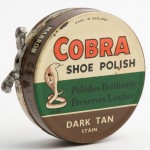
After Charles died in 1929 Kathleen spent more time in Lancing lending her support to many local causes. She remarried in 1941 the Very Rev. Owen C. Dampier Bennett but he died after an operation in 1950 leaving Kathleen a widow again until her death on the 28th March 1968. She is buried with Charles in St James’ churchyard. In January 1970 the dedication took place of the lychgate, which was presented to the church by the three sons of Charles and Kathleen in memory of their parents.
Their second son, Charles Percy, married a girl from Shoreham and had a home built in Brighton Road called Beachcroft. He took over his Father’s interest in the Children’s Heart Home and the Scouts, where he became scoutmaster in 1936 and Assistant County Commissioner in 1945. He became a J.P. in 1956 serving the Steyning division and was a West Sussex County Councillor. Other Lancing societies that he was involved with include the British Legion, Horticultural Society, Sussex County Minor Football League, the Parish Council and was also governor of Lancing Secondary School. In 1959 he was awarded an MBE in the Birthday Honours list.
 In 1924 the ‘fish-plate’ metal opener introduced on Cherry Blossom lids was a first for any tins and they paved the way for the butterfly opening tins, eventually replaced by today’s ‘press to open’ in 1983. With the amalgamation with Nugget Polish Company Ltd in 1929 the company changed its name to Chiswick Products Ltd. This was a merger of the two biggest manufacturers of boot and floor polishes in the world creating a global brand with factories and warehouses abroad as well as in the UK and a worldwide distribution.
In 1924 the ‘fish-plate’ metal opener introduced on Cherry Blossom lids was a first for any tins and they paved the way for the butterfly opening tins, eventually replaced by today’s ‘press to open’ in 1983. With the amalgamation with Nugget Polish Company Ltd in 1929 the company changed its name to Chiswick Products Ltd. This was a merger of the two biggest manufacturers of boot and floor polishes in the world creating a global brand with factories and warehouses abroad as well as in the UK and a worldwide distribution.
In 1928 E. Brown & Son Ltd is bought bringing not only the Meltonian brand name and market share but also Fred Brown himself. The Meltonian company continued independent manufacture at their Cricklewood factory until at least 1953 and somewhere along the line the company name changes to Meltonian (E. Brown & Son) Ltd. In 1938 William Wren’s polish business is acquired bringing with it Lavendo furniture polish; a white cleaner called Puwite and Wren’s Super Wax Shoe Polish. This again trades independently from their Northampton factory until the William Wren Ltd and Meltonian Ltd companies are combined to form Meltonian Wren Ltd and manufacture of both brands are eventually transferred to the former Blyth & Platt’s Cobra factory in Watford whose business was wound up in 1953.
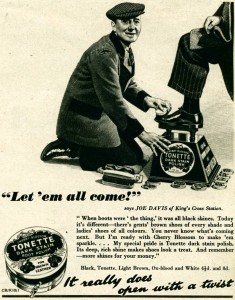 The Cherry Blossom, Cobra, Wren’s, Propert’s, Nugget and Meltonian brand names lived on as separate product lines. In 1954 Chiswick Products Ltd merged into the newly-formed Reckitt & Colman Holdings Ltd and became integrated into the Reckitt empire with production and offices moving from factory to factory as the company reorganised and consolidated production. The Cherry Blossom brand introduced Padawax, a liquid polish applied with an integral sponge. By the 1960’s Reckitt and Colman were employing some 1,500 people in Chiswick not only making and filling polishes but also stamping and printing the tins and creating their own packaging. The factories created everything they needed on site to distribute around the world. Through 1962 to 1966 they added a new laboratory and underwent major rebuilding adding new manufacturing, office, storage, computer and canteen facilities.
The Cherry Blossom, Cobra, Wren’s, Propert’s, Nugget and Meltonian brand names lived on as separate product lines. In 1954 Chiswick Products Ltd merged into the newly-formed Reckitt & Colman Holdings Ltd and became integrated into the Reckitt empire with production and offices moving from factory to factory as the company reorganised and consolidated production. The Cherry Blossom brand introduced Padawax, a liquid polish applied with an integral sponge. By the 1960’s Reckitt and Colman were employing some 1,500 people in Chiswick not only making and filling polishes but also stamping and printing the tins and creating their own packaging. The factories created everything they needed on site to distribute around the world. Through 1962 to 1966 they added a new laboratory and underwent major rebuilding adding new manufacturing, office, storage, computer and canteen facilities.
All change in 1970 though as Reckitts underwent restructuring which included the Chiswick plant. First the group’s head office transferred from Hull to Chiswick, then in 1972 manufacturing transferred from Chiswick to Hull. In 1985 they opened a new headquarters building and in 1998 the head office moved from Chiswick to Windsor and subsequently Slough.
Into the 1980’s then and things start getting complicated as we switch focus to Kiwi. During the ’50s Kiwi opened new manufacturing plants in Britain followed by India, France, Canada, South Africa, Spain and Pakistan. By 1967 the Kiwi brand became so big and its product range so diverse, that all KIWI companies were brought together under one umbrella: Kiwi International. A merger in 1981 of two long established Australian companies, Nicholas International Ltd (a pharmaceutical company) and the Kiwi Polish Company Pty Ltd and formed Nicholas Kiwi Limited. In 1984 Nicholas Kiwi was acquired by the American based Consolidated Foods Corporation, which in turn changed its name to Sara Lee Corporation. Sara Lee also owned the Tuxan brand of shoe polish and so sold both Tuxan and Kiwi polish brands in the UK.
 In October 1991, although initially after the Meltonian brand which Reckitts had been rebuilding, Sara Lee Household & Personal Care UK Ltd (a subsidiary of the parent Sara Lee Corporation) acquired the entire Reckitt & Colman United Kingdom shoe care business, including its export business from the United Kingdom (the relevant Australian and New Zealand trade marks being assigned to Sara Lee’s Australian subsidiary, Kiwi Brands Pty Ltd). Reckitt & Colman’s USA shoe care businesses were at the same time acquired by Kiwi Brands Inc, another Sara Lee subsidiary. The brands acquired by SL/HPC UK were Cherry Blossom, Meltonian, Properts, Wrens and Magix; Reckitt & Colman retained, however, the Nugget brand (not recently sold in the United Kingdom), and its shoe care businesses in many countries of Asia, Africa and Latin America and some European countries, notably Spain. Certain stock was acquired, and a limited range of manufacturing equipment (filling line, a jar line for creams, a dye line, and mixing tanks and other processing equipment for liquid and cream polishes). This equipment was transferred to Sara Lee’s plant at wax candle plant Honley in Yorkshire where tinned Cherry Blossom polish paste was now manufactured on Sara Lee’s existing equipment together with the Kiwi paste polish, the same product under both brand names. Reckitt & Colman continued to manufacture polishes under contract to Sara Lee for six months following the merger at its unit in Hull; this unit was subsequently been closed, and the remaining equipment sold or disposed of throughout the Reckitt & Colman group.
In October 1991, although initially after the Meltonian brand which Reckitts had been rebuilding, Sara Lee Household & Personal Care UK Ltd (a subsidiary of the parent Sara Lee Corporation) acquired the entire Reckitt & Colman United Kingdom shoe care business, including its export business from the United Kingdom (the relevant Australian and New Zealand trade marks being assigned to Sara Lee’s Australian subsidiary, Kiwi Brands Pty Ltd). Reckitt & Colman’s USA shoe care businesses were at the same time acquired by Kiwi Brands Inc, another Sara Lee subsidiary. The brands acquired by SL/HPC UK were Cherry Blossom, Meltonian, Properts, Wrens and Magix; Reckitt & Colman retained, however, the Nugget brand (not recently sold in the United Kingdom), and its shoe care businesses in many countries of Asia, Africa and Latin America and some European countries, notably Spain. Certain stock was acquired, and a limited range of manufacturing equipment (filling line, a jar line for creams, a dye line, and mixing tanks and other processing equipment for liquid and cream polishes). This equipment was transferred to Sara Lee’s plant at wax candle plant Honley in Yorkshire where tinned Cherry Blossom polish paste was now manufactured on Sara Lee’s existing equipment together with the Kiwi paste polish, the same product under both brand names. Reckitt & Colman continued to manufacture polishes under contract to Sara Lee for six months following the merger at its unit in Hull; this unit was subsequently been closed, and the remaining equipment sold or disposed of throughout the Reckitt & Colman group.
So here we see all the well known and historical brand names being bought and owned by just one company and gave Sara Lee 80% of the UK shoe polish market. There were other companies in the field but all with limited exposure: Punch Sales Ltd (Punch Brand, largely trade sales), S C Johnson & Co Ltd (which sold only one product, a sponge applicator) Carr & Day & Martin Ltd, Dougmar Ltd, Dunkelman & Son Ltd, Salamander AG (a German company, which supplies the Woly brand), Salzenbrodt GmbH & Co KG (also German, which supplies the Collonil brand).
In 1992 the Competition Commission looked into the Sara Lee acquisition and determined that because the Cherry Blossom and Kiwi brands were now one and the same product that some rationalisation would be brought in and a major brand lost and that domination of the market would squeeze out smaller players and prevent other manufacturers from entering the market. They also thought that UK production (in any case now only done at the Honley site) would be closed and moved abroad to Rouen, France. They concluded “We believe therefore that the merger may be expected to have effects adverse to the public interest. These are that there is a significant reduction in competition in the supply of shoe polish products to the self-selection sector of the market; Sara Lee has the opportunity, of which it may be expected to take advantage, to introduce substantial increases in prices to retailers without constraining forces being brought into play; and such increases are likely to be passed on to consumers.”
The Competition Commission required the following solution: “We therefore recommend that Sara Lee should be required to divest itself of the Cherry Blossom brand and associated trade marks and, pending divestment, to keep the brand and trade marks in good standing by, for example, maintaining production of the branded products, their quality and their prices at present levels.”
In 1994 Grangers of Alfreton Derbyshire acquired the Cherry Blossom brand name who since have continued product development and innovation and modernising the brand and image in the UK. Reckitt Benckiser (India) still hold the rights to the Cherry Blossom brand in Asia and still manufacture, market and sell the Cherry Blossom brand in India and Pakistan.
As of 2010 Punch, Woly, Collonil are minority players in the UK market – Punch sell largely through trade outlets, Woly in more specialised outlets with niche products, Collonil although having a wide portfolio aren’t a well known UK brand. Own brand supermarket shoe polishes are not insignificant – thought to achieve 50% share when sold alongside main brands. But predominant is the Sara Lee owned Kiwi brand and the only UK manufactured ‘big’ brand of shoe polish, Cherry Blossom.
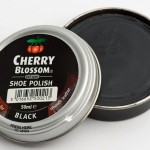 And so, rather splendidly, despite brands being bought and sold over the years we have ended up where we started (almost). In 1906 Kiwi and Cherry Blossom were the biggest, most well known and best selling brands. 104 years later nothing has changed.
And so, rather splendidly, despite brands being bought and sold over the years we have ended up where we started (almost). In 1906 Kiwi and Cherry Blossom were the biggest, most well known and best selling brands. 104 years later nothing has changed.
Written by David Pratt
Photo of K&M Candles/Kiwi factory – Richard Harvey
Product and advert photos: David Pratt
